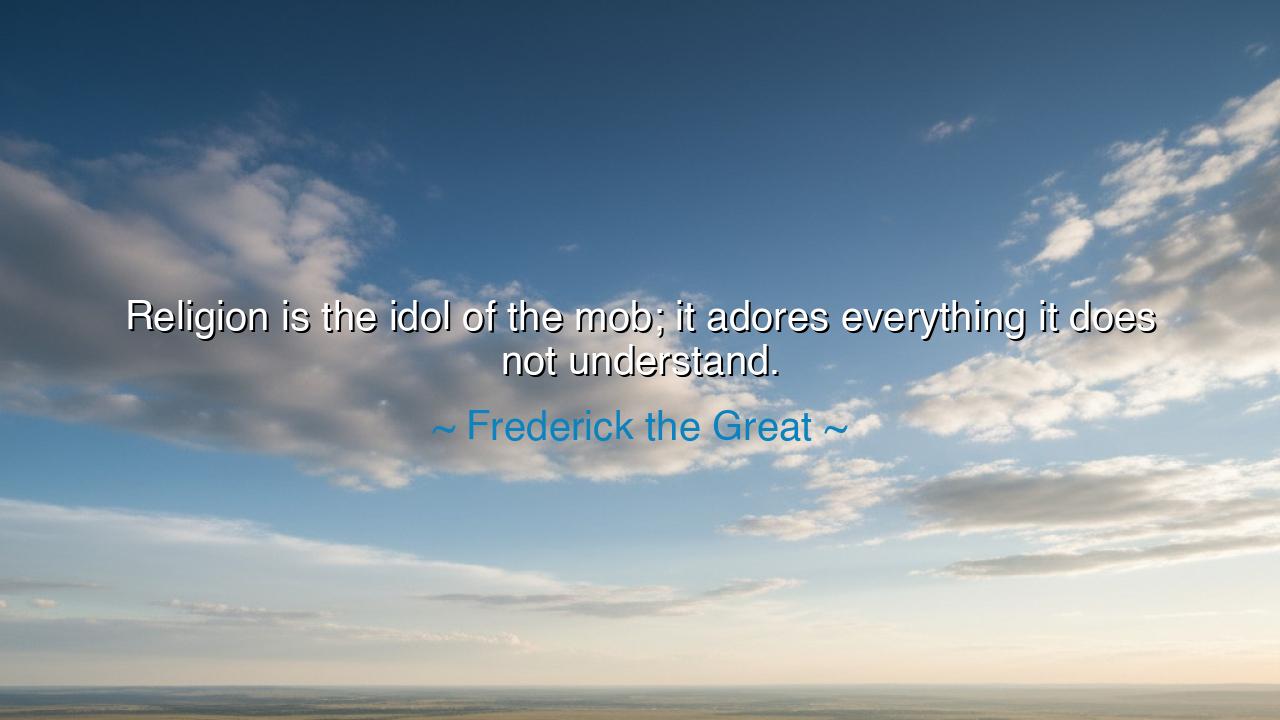
Religion is the idol of the mob; it adores everything it does not






"Religion is the idol of the mob; it adores everything it does not understand." Thus declared Frederick the Great, the philosopher-king of Prussia, who wore a crown yet thought like a scholar, who commanded armies yet questioned the gods. In these words, he pierced to the heart of a timeless truth—that ignorance often bows before the altar of mystery, and that what men do not comprehend, they too easily worship. Frederick’s insight was not born of disdain for faith itself, but of sorrow at how the multitude mistakes blind devotion for true understanding. He saw that when the soul ceases to seek truth, it becomes content to adore shadows, confusing fear for reverence and habit for holiness.
In the days of the ancients, the sages often warned that idolatry begins not with stone statues, but with the stillness of the mind. When men cease to question, they begin to worship without reason; and when they worship without reason, they are led not by light, but by superstition. This is what Frederick called “the idol of the mob.” The mob does not think—it feels, it trembles, it believes as the crowd believes, never pausing to ask why. To such hearts, the unknown becomes sacred simply because it is unknown, and fear becomes the language of faith. Yet true religion, the sages taught, is not the adoration of mystery but the pursuit of understanding—the harmony of heart and reason beneath the eternal sky.
Consider the tale of Giordano Bruno, the fiery thinker of the Renaissance, who dared to declare that the universe was infinite and filled with countless worlds. The mob, stirred by priests who saw heresy in his words, called him wicked, a blasphemer, an enemy of God. They did not understand him, and therefore, as Frederick would later say, they adored their ignorance by destroying what challenged it. Bruno was burned at the stake in the year 1600, his eyes raised to the heavens he had dared to describe. And so, in fire and smoke, the world silenced a man who had seen more truth than his age could bear. His death became a grim testament to Frederick’s warning: that when men worship what they do not understand, they may slay those who do.
Yet Frederick’s words are not an assault upon all religion—no, they are a call to purify it. He himself was not without reverence for the divine, but his reverence was born of thought, not fear. He desired a faith illuminated by knowledge, a belief strengthened by reason. To adore blindly is easy; to understand what one adores, that is the work of the wise. Religion, when stripped of inquiry, becomes tyranny over the mind; but when joined with wisdom, it becomes liberty of the soul. Thus, the king’s words stand not against the temple, but against the chains that men themselves forge within it.
We must, therefore, guard our hearts from becoming part of that unthinking multitude. Let us not bow before every mystery, nor tremble before every thunderclap of tradition. The divine is not diminished by our understanding—it is honored by it. To study the stars is not to defy the Creator, but to marvel more deeply at His design. To question is not to blaspheme, but to seek truth in its purest form. The wise man does not kneel before what he does not know; he rises to learn what he can, and in learning, finds the face of the sacred more clearly revealed.
And yet, let us temper knowledge with humility. For understanding without awe becomes arrogance, just as awe without understanding becomes idolatry. The balance lies between the two—reason guided by reverence, and reverence enlightened by reason. Frederick’s voice calls across the centuries not for rebellion against belief, but for the courage to think within belief, to cleanse devotion of superstition, and to seek truth even when the crowd cries “blasphemy.”
So, my listener, the lesson is thus: do not adore what you do not understand. Instead, strive to understand what you adore. Let no man’s voice be your conscience, and no tradition your prison. Study deeply, question bravely, and let your faith be your own, born of insight, not imitation. For in the end, it is not the multitude that reaches the truth—it is the solitary seeker who dares to walk beyond the temple gates, guided not by fear, but by the quiet fire of wisdom.






AAdministratorAdministrator
Welcome, honored guests. Please leave a comment, we will respond soon